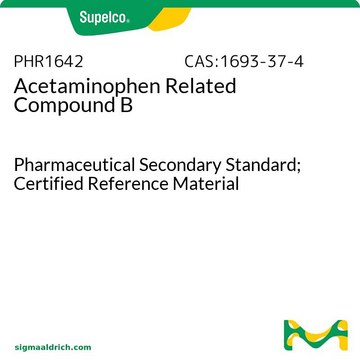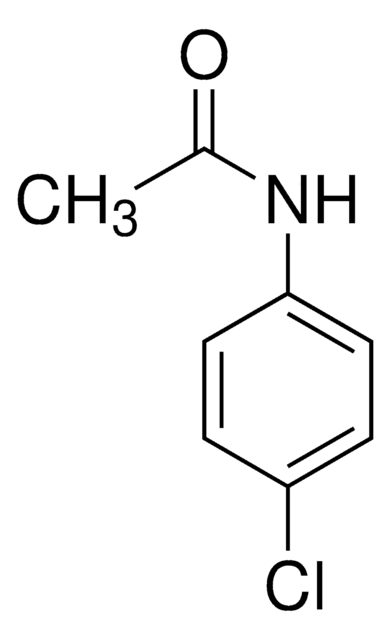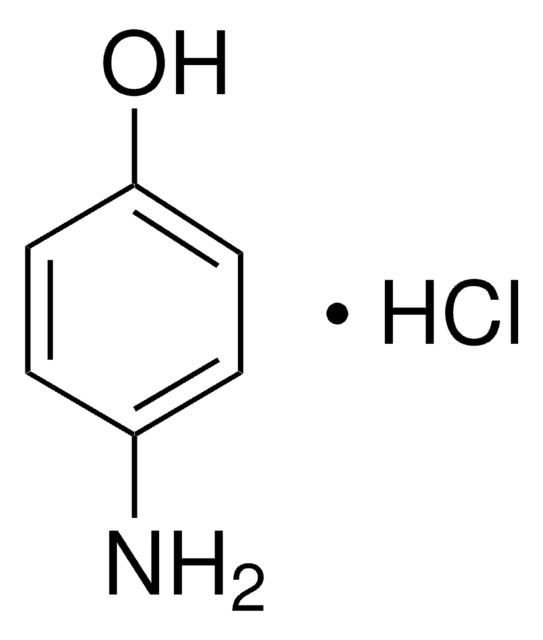PHR1149
Acetaminophen Related Compound J
Pharmaceutical Secondary Standard; Certified Reference Material
Synonym(s):
4′-Chloroacetanilide, N-(4-Chlorophenyl)acetamide, Acetic acid 4-chloroanilide, NSC 40563, NSC 444
About This Item
Recommended Products
grade
certified reference material
pharmaceutical secondary standard
Quality Level
Agency
traceable to Ph. Eur. Y0001945
traceable to USP 1003100
API family
paracetamol, acetaminophen
CofA
current certificate can be downloaded
technique(s)
HPLC: suitable
gas chromatography (GC): suitable
mp
176-178 °C (lit.)
application(s)
pharmaceutical (small molecule)
format
neat
storage temp.
2-30°C
SMILES string
CC(=O)Nc1ccc(Cl)cc1
InChI
1S/C8H8ClNO/c1-6(11)10-8-4-2-7(9)3-5-8/h2-5H,1H3,(H,10,11)
InChI key
GGUOCFNAWIODMF-UHFFFAOYSA-N
Looking for similar products? Visit Product Comparison Guide
General description
Pharmaceutical secondary standards for application in quality control, provide pharma laboratories and manufacturers with a convenient and cost-effective alternative to the preparation of in-house working standards.
It is an impurity of the widely used antipyretic and analgesic drug acetaminophen, also known as paracetamol.
Application
- Separation and estimation of acetaminophen and its process impurities in commercial acetaminophen tablets using high-performance liquid chromatography (HPLC)
- Development and validation of HPLC-based stability indicating method for the determination of acetaminophen, chlorpheniramine maleate, and their possible degradation products in an over-the-counter syrup formulation
- Detection and quantification of paracetamol, phenylephrine hydrochloride, and paracetamol impurities in pharmaceutical formulations using four chemometric-based spectrophotometric methods
- Impurity analysis of a combined suppository dosage form of paracetamol, codeine phosphate hemihydrate, and pitophenone hydrochloride using ion-pair reversed-phase liquid chromatography in combination with UV detection
- Development of a thin-layer chromatography method combined with densitometry for the separation of acetaminophen and its related impurities from commercial dosage forms
Analysis Note
Other Notes
Footnote
Recommended products
related product
Signal Word
Warning
Hazard Statements
Precautionary Statements
Hazard Classifications
Eye Irrit. 2 - Skin Irrit. 2 - STOT SE 3
Target Organs
Respiratory system
Storage Class Code
11 - Combustible Solids
WGK
WGK 3
Flash Point(F)
Not applicable
Flash Point(C)
Not applicable
Regulatory Listings
Regulatory Listings are mainly provided for chemical products. Only limited information can be provided here for non-chemical products. No entry means none of the components are listed. It is the user’s obligation to ensure the safe and legal use of the product.
JAN Code
PHR1149-1G:
PHR1149-1G-PW:
Choose from one of the most recent versions:
Certificates of Analysis (COA)
It looks like we've run into a problem, but you can still download Certificates of Analysis from our Documents section.
If you need assistance, please contact Customer Support.
Already Own This Product?
Find documentation for the products that you have recently purchased in the Document Library.
Customers Also Viewed
Our team of scientists has experience in all areas of research including Life Science, Material Science, Chemical Synthesis, Chromatography, Analytical and many others.
Contact Technical Service










